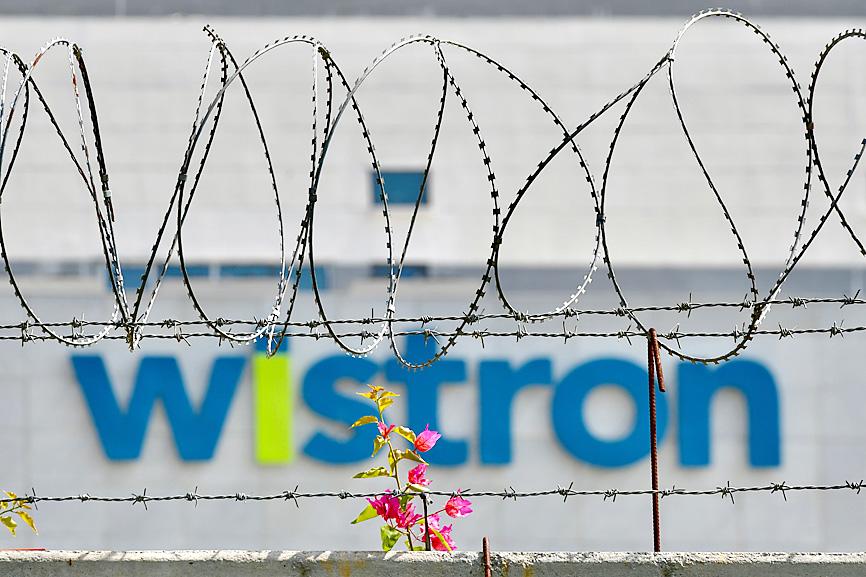A riot on Saturday at a Wistron Corp (緯創) plant in India resulted in estimated losses of 4.37 billion rupees or almost NT$1.7 billion (US$59.75 million), Indian media reported.
The Times of India yesterday reported that the preliminary estimate of losses included thousands of iPhones stolen during the riot.
Wistron would suspend operations at the iPhone factory in Karnataka state for two weeks, a source familiar with the incident said.

Photo: AFP
Because the incident occurred before the peak Christmas season, Wistron’s losses could exceed the preliminary estimate, the source added.
About 2,000 workers at Wistron’s Narasapura factory, became enraged after the night shift, apparently over pay cuts, destroying furniture and factory assembly units, according to Indian media, which said there were even attempts to set fire to vehicles on site.
The Times of India on Sunday reported that the employees were angry because they were not being paid the wages they agreed upon when they were recruited.
A Wistron representative later confirmed that some office furniture at the factory was damaged, but equipment on the main assembly lines and in the warehouses remains intact.
Indian police have arrested about 130 people in relation to the incident, sources said.
Wistron on Sunday said the riot at the plant in Narasapura was caused by unidentified outside instigators who broke into the factory and sabotaged the facility, adding that the company would work with authorities and police to investigate the incident.
Karnataka Minister of Labor Shivaram Hebbar told Indian news media on Sunday that the disputes about labor contracts between Wistron and its workers has dragged on for more than three months.
Wistron’s production lines in India have long been dedicated to assembling more affordable iPhones, with the iPhone SE accounting for the majority of production, and starting in the second half of this year they have rolled out smaller iPhone 12 models, local media has reported.
Wistron is able to move production capacity to other factories in India and Kunshan, China, to make up the shortfall caused by the violence at the Narasapura plant, so the effect on the company should be limited, analysts said.
However, Apple could decide to investigate Wistron for possible breach of its supplier code of conduct, an analyst said.

UNCERTAINTY: Innolux activated a stringent supply chain management mechanism, as it did during the COVID-19 pandemic, to ensure optimal inventory levels for customers Flat-panel display makers AUO Corp (友達) and Innolux Corp (群創) yesterday said that about 12 to 20 percent of their display business is at risk of potential US tariffs and that they would relocate production or shipment destinations to mitigate the levies’ effects. US tariffs would have a direct impact of US$200 million on AUO’s revenue, company chairman Paul Peng (彭雙浪) told reporters on the sidelines of the Touch Taiwan trade show in Taipei yesterday. That would make up about 12 percent of the company’s overall revenue. To cope with the tariff uncertainty, AUO plans to allocate its production to manufacturing facilities in

TAKING STOCK: A Taiwanese cookware firm in Vietnam urged customers to assess inventory or place orders early so shipments can reach the US while tariffs are paused Taiwanese businesses in Vietnam are exploring alternatives after the White House imposed a 46 percent import duty on Vietnamese goods, following US President Donald Trump’s announcement of “reciprocal” tariffs on the US’ trading partners. Lo Shih-liang (羅世良), chairman of Brico Industry Co (裕茂工業), a Taiwanese company that manufactures cast iron cookware and stove components in Vietnam, said that more than 40 percent of his business was tied to the US market, describing the constant US policy shifts as an emotional roller coaster. “I work during the day and stay up all night watching the news. I’ve been following US news until 3am

COLLABORATION: Given Taiwan’s key position in global supply chains, the US firm is discussing strategies with local partners and clients to deal with global uncertainties Advanced Micro Devices Inc (AMD) yesterday said it is meeting with local ecosystem partners, including Taiwan Semiconductor Manufacturing Co (TSMC, 台積電), to discuss strategies, including long-term manufacturing, to navigate uncertainties such as US tariffs, as Taiwan occupies an important position in global supply chains. AMD chief executive officer Lisa Su (蘇姿丰) told reporters that Taiwan is an important part of the chip designer’s ecosystem and she is discussing with partners and customers in Taiwan to forge strong collaborations on different areas during this critical period. AMD has just become the first artificial-intelligence (AI) server chip customer of TSMC to utilize its advanced

Six years ago, LVMH’s billionaire CEO Bernard Arnault and US President Donald Trump cut the blue ribbon on a factory in rural Texas that would make designer handbags for Louis Vuitton, one of the world’s best-known luxury brands. However, since the high-profile opening, the factory has faced a host of problems limiting production, 11 former Louis Vuitton employees said. The site has consistently ranked among the worst-performing for Louis Vuitton globally, “significantly” underperforming other facilities, said three former Louis Vuitton workers and a senior industry source, who cited internal rankings shared with staff. The plant’s problems — which have not